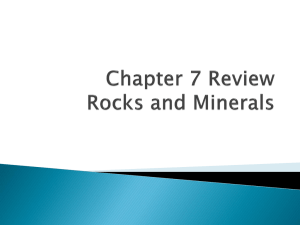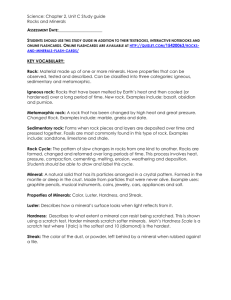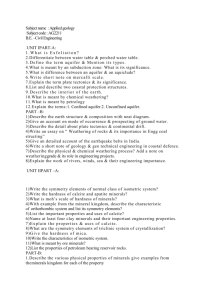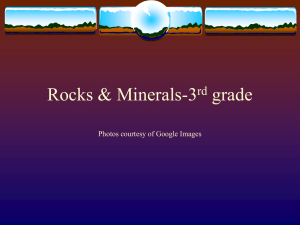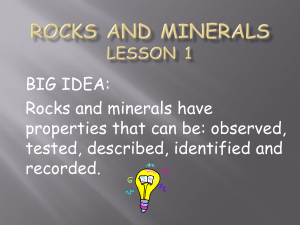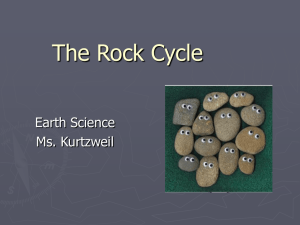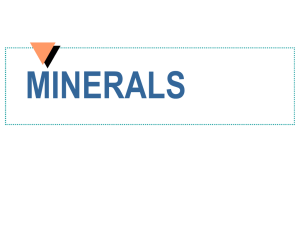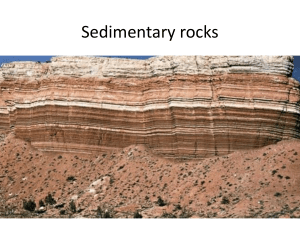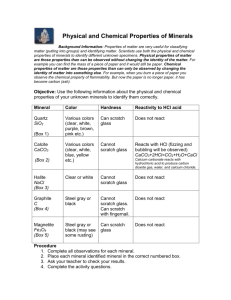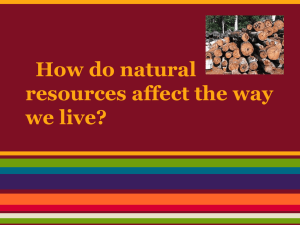Rock cycle
advertisement
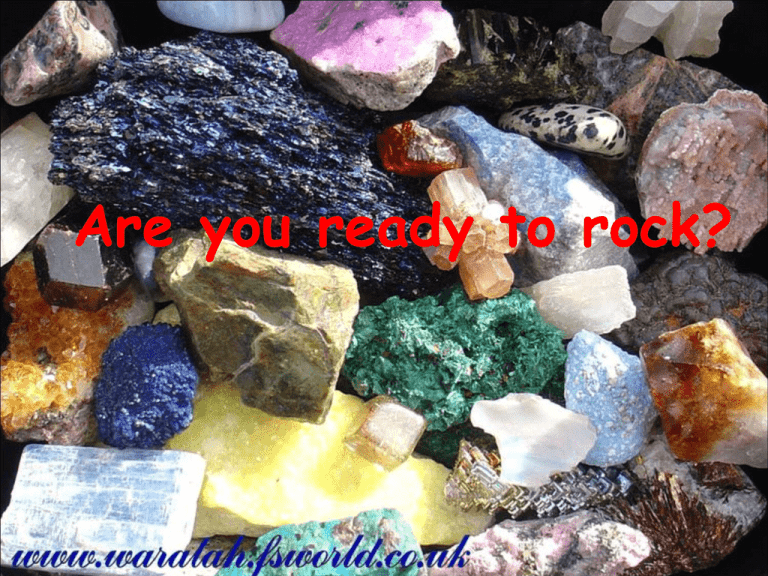
Are you ready to rock? - Rocks and minerals surrounds us. From diamonds, to granite counters, they are widely used in our lives. - In this section you will be learning about rocks and minerals. - You will notice however, that they are made up of many elements that you might be familiar with. - Let’s check it out: www.rocksandminerals4u.com/minerals.html A trip to Italy… Carrara, near Florence is a mountain of natural marble! What a beauty! A trip to Greece… (the island of Santorini) Santorini is an extinct volcano. A trip to Prince Edward Island The Island is formed from sedimentary bed rock of soft, red sandstone which produces the rich, red soil. The redness of the soil is due to the high iron-oxide (rust) content. QUICK REVIEW OF THE EARTH’S LAYERS AND LITOSPHERE P290 AND 302 - Our planet is divided into three main layers: the crust, the mantle and the core. The lithosphere p302 • The lithosphere is a SOLID structure that includes the Earth’s crust and part of the upper mantle. • It is important for: – Plants to grow, that is where they get their minerals. – Several animal’s habitat – Natural resources such as crude oil The lithosphere The rock cycle Voir le site web: http://www.classz one.com/books/ea rth_science/terc/c ontent/investigatio ns/es0602/es0602 page02.cfm Igneous rocks • Igneous rocks are formed when magma cools down EXTRUSIVES INTRUSIVES: Slow cooling of magma under the crust. Ex: gabbro, granite Fast cooling of magma outside of the crust. Ex: obsidian Pumice rock Sedimentary rock • When igneous rocks move by erosion: (wind, rain, other climatic conditions) • Debris pile up under water to give sedimentary rock. Fossils are found in sedimentary rocks. Ex: calcite (like chalk) Below is shale, a rock formed by compression of layers of sediments calcite Shale Metamorphic rocks • When sedimentary or igneous rocks are compacted under the crust, they turn into metamorphic rock. • They are the effect of high pression and high heat. Gneiss is metamorphosed granite Marble is metamorphosed calcite Hardness scale • If you compare a piece of glass with a wooden hammer, which you think will be hardest? Which brakes easily? Glass, of course will break easily. BUT glass is harder than wood because it can scratch it! And wood cannot scratch glass. • Diamonds can scratch glass BUT glass can’t scratch diamonds! -Hardness Is a characteristic property of matter. It is the ability to resist a scratch or change of shape. - We use the hardness of minerals, like gemstones and rocks based on the Mohs Scale. -This scale was developed in the 19th century by Frédéric Mohs (1173-1839) a german minearologist. • Mohs numbered ten minerals 1 to 10. • Each can scratch a mark on minerals with lower numbers -Example1: Topaz (hardness 8) can scratch quartz (hardness 7), but not diamond (hardness 10) The fingernail can scratch gypsum (h 2) but not calcite, so its hardness is 2.5. Hardness of various objects -Fingernail: 2,5 -Penny : 3 -Glass slide: 5,5 -Steel Nail: 6,5 -Porcelain plate: approx 7 Find the approximate hardness of the minerals in your lab show your work Mica Pyrite Galena Quartz MICA QUARTZ PYRITE GALENA
